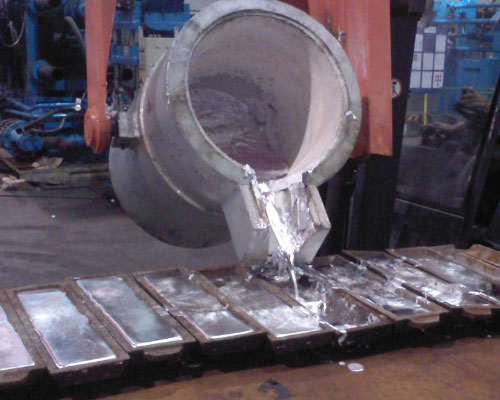How an Aluminum Foundry ensures durable components
Wiki Article
The Essential Uses Aluminum Foundry in Various Industries and Their Impact
Aluminum foundries serve as a vital source within many sectors. Their light-weight and resilient products considerably boost performance in automotive, aerospace, building and construction, and electronic devices sectors. As each market leverages aluminum's one-of-a-kind properties, they likewise add to sustainability efforts. This complex impact prompts a deeper expedition of how Aluminum shaped these markets. What specific technologies and advantages develop from its use?Automotive Sector Applications
The vehicle industry increasingly counts on Aluminum Foundry applications to boost car performance and performance. Aluminum's lightweight nature contributes considerably to fuel economy, making it a favored option for manufacturers aiming to decrease discharges and enhance total car characteristics. Elements such as engine blocks, transmission housings, and wheels are typically generated through Aluminum spreading processes, permitting for elaborate layouts that satisfy extensive safety and efficiency criteria.
Aerospace Innovations

Additionally, using aerospace-grade Aluminum alloys boosts resistance to rust and tiredness, necessary for the requiring settings aircraft face. Innovations in additive production also enable quick prototyping and customization of components, minimizing preparations and costs.
Building and construction and Infrastructure
While the building and framework industries continue to advance, Aluminum foundries are progressively recognized for their contributions to modern structure practices. Light weight aluminum's lightweight nature and high toughness make it an ideal material for various structural applications. Shops provide components such as beams, structures, and facades that improve the resilience and long life of buildings and framework jobs.Aluminum's deterioration resistance plays a crucial role in prolonging the lifespan of frameworks subjected to rough ecological conditions. The energy effectiveness of Aluminum products additionally lines up with sustainable structure campaigns, contributing to lower power usage in construction. In addition, innovative casting strategies have actually expanded the design possibilities, permitting designers and architects to create visually pleasing yet useful structures.
Electronics Manufacturing
Aluminum factories play a substantial role in the electronics making sector, where the demand for thermally conductive and lightweight products is critical. Aluminum Castings. Parts such as warmth sinks, casings, and braces are usually created using Aluminum due to its outstanding thermal properties and ability to dissipate warmth efficiently. This is vital in electronic gadgets, where getting too hot can cause failure and reduced efficiencyThe adaptability of Aluminum permits complex designs and exact machining, which are crucial in contemporary electronic devices. Additionally, aluminum's non-magnetic homes make Aluminum Castings it suitable for applications in delicate electronic tools, reducing disturbance. Additionally, light weight aluminum's resistance to rust improves the longevity of digital components, making certain long life and integrity.
Sustainability and Recycling Efforts
Provided the increasing focus on ecological obligation, the Aluminum Foundry sector has actually made significant strides in sustainability and reusing efforts. Aluminum is inherently recyclable, allowing foundries to recycle and redeem material with minimal energy expenditure compared to key manufacturing. This closed-loop recycling procedure not just reduces waste yet likewise lowers greenhouse gas emissions, adding to an extra sustainable production model.Numerous factories are adopting energy-efficient technologies, including eco-friendly power sources, to power their procedures. This change not just lowers reliance on fossil fuels however also enhances general functional efficiency
Market partnerships are more promoting sustainable methods, such as sharing ideal practices and establishing ingenious reusing approaches. By focusing on these efforts, the Aluminum Foundry sector is positioning itself as a leader in lasting production, lining up with international targets for sustainability while meeting the needs of different markets.

Regularly Asked Inquiries
What Are the Main Benefits of Utilizing Aluminum in Foundry Processes?
The primary advantages of utilizing Aluminum in Foundry procedures include its light-weight nature, exceptional corrosion resistance, high thermal and electric conductivity, and convenience, permitting elaborate layouts and effective recycling, inevitably improving total production efficiency and decreasing expenses. - Aluminum CastingsJust How Does Aluminum Foundry Impact Item Lifecycle Monitoring?
Aluminum Foundry considerably boosts item lifecycle monitoring by making it possible for efficient product use, minimizing waste, and assisting in recycling. Its light-weight buildings enhance transport effectiveness, while resilience expands product life expectancy, ultimately adding to sustainability and cost-effectiveness in manufacturing.Are There Specific Obstacles in Aluminum Foundry Production?
Specific challenges in Aluminum Foundry production consist of managing temperature control, guaranteeing worldly quality, decreasing waste, and adjusting to changing market needs. These elements can impact effectiveness, expense, and total competitiveness within the industry.What Security Procedures Are Crucial in Aluminum Foundry Procedures?
Vital precaution in Aluminum Foundry procedures include individual safety tools, proper air flow, routine tools maintenance, danger communication, and emergency situation response training. Implementing these techniques assurances worker safety and reduces dangers connected with high-temperature steel handling.Exactly how Does the Price of Aluminum Contrast to Various Other Steels in Foundry Usage?
The cost of Aluminum is generally less than that of steels like copper and titanium, making it an affordable choice for several Foundry applications. This affordability contributes to its prevalent usage across different sectors.Aluminum factories offer as an important source within various sectors. The vehicle industry progressively relies on Aluminum Foundry applications to improve car efficiency and effectiveness. The material's recyclability additionally aligns with the industry's push in the direction of sustainability, as recycled Aluminum requires considerably less energy to process contrasted to primary aluminum. Aluminum factories play a substantial function in the electronic devices manufacturing industry, where the demand for thermally conductive and light-weight products is vital. Given the raising emphasis on environmental responsibility, the Aluminum Foundry sector has made considerable strides in sustainability and recycling initiatives.
Report this wiki page